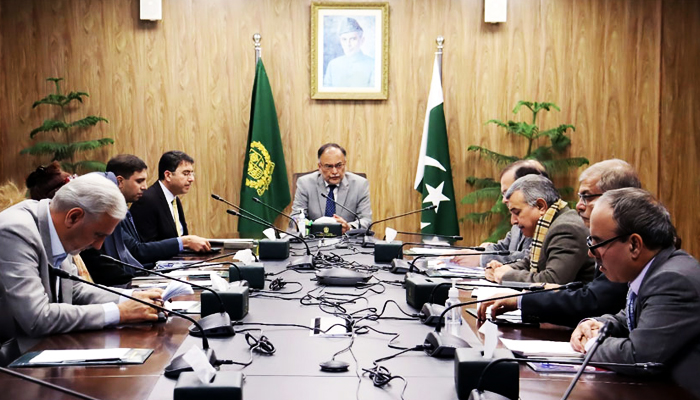Govt to meet IMF conditions without overburdening common man: Ahsan Iqbal
The previous government had "recklessly" agreed upon IMF programme, federal minister says
The government would meet the International Monetary Fund's (IMF) conditions for completing the programme, Minister for Planning, Development, and Special Initiatives Ahsan Iqbal said Thursday, vowing that the common man would not be affected.
The federal minister, during his address at a meeting in Islamabad, said the previous government had "recklessly" agreed upon the programme, therefore, the current administration has no option but to continue it.
"We have to do a lot of adjustments, but we will take decisions in the larger interests of the state,” he said and added: “We will try to put a minimum burden on the poor and common people."
The government faces an uphill task on the economic front amid a devaluing currency, rising inflation, depleting forex reserves, and a stalled IMF programme.
Despite the government's repeated assurances that inflows would begin this month, their claims have not yet materialised, resulting in a market frenzy.
The minister said Pakistan’s economy was in a dismal state when the current government took over, and given the shortage of time, it had decided to take short-term measures to turn the economy around.
Iqbal stressed the need for mobilising all available resources to increase productivity and exports of the country to get rid of foreign loans permanently.
“Pakistan’s productivity capacity is very low as compared to the standard average”, he said, adding that in the agriculture sector alone, the country could earn billions of dollars by taking measures to increase the crops’ yield per acre.
For instance, he said, the per acre wheat production in Pakistan can be increased by up to 80% by improving on-farm management. Similarly, he said, “our industrial production possesses numerous inefficiencies due to which we are not competitive with the world”.
The biggest challenge in 75 years, the federal minister said, is that Pakistan’s productivity capacity could not be integrated with the global markets.
Iqbal pointed out that export-led growth is important to resolve the balance of payment issues, therefore, he stressed the need to take all measures to earn maximum foreign exchange reserves.
“We have to do resource mobilisation and also have to increase tax to GDP ratio up to the global average of over 18% which is only at 9% in Pakistan”.
He said in the previous four years, the debt servicing burden had increased to Rs 4500 billion, so if the resources are not mobilised, the country’s tax would be spent on debt repayment.
Furthermore, he said an increase in investment was another important factor to ensure sustainable economic development.
“If the Pakistani investors only bring out their money and invest in the country, we will not need to go to the IMF or any other lender”, he said adding that foreign direct investment would also have to be increased up to $25-30 billion per year.
He also asked the Ministry of Commerce to take urgent measures to increase the country’s exports from the current $32 billion to over $100 billion in the shortest possible time.
-
Will Warner Bros finalize deal with Paramount or stays loyal with Netflix's offer?
-
$44 billion Bitcoin blunder: Bithumb exchange apologizes for accidental payout
-
Global memory chip crunch puts spotlight on Apple; Will iPhone become more pricey?
-
Bitcoin plummets toward $60,000 as investors dump risky bets
-
Bitcoin crashes below $63K as regulatory pressure and market fears grow
-
Bitwise Crypto Industry innovators ETF: What investors should do in 2026?
-
Nintendo shares slide again as momentum fears grow
-
Gold, silver prices fallen sharply; What’s driving the drop?












